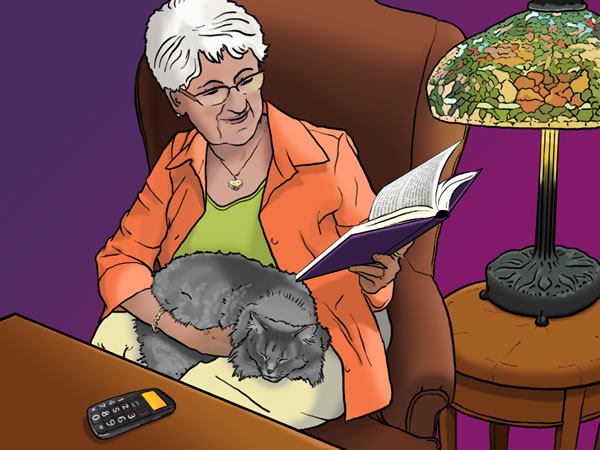-
Carol is one of the personas from our book, A Web for Everyone. No set of personas can represent the entire world of people with disabilities, but we wanted to bring some of the statistics and demographic data to life in the stories of these personas.
You can download an overview of all the personas from our Resources page. The personas images, created by Tom Biby, are available on Flickr.
Carol: Grandmother with macular degeneration

My grandkids are dragging me into the world of technology. Carol has always loved reading, so her fading eyesight is a real sorrow to her. She tried recorded books, but she didn’t like listening instead of seeing the words in front of her.
As a bookkeeper for 25 years, she made the transition from ledgers to a software program, so she’s happy to use the computer. She has an old home computer, which she uses the same way she always did her work—carefully checking everything as she goes. She loves getting emails from her grandkids (and a few friends). She likes reading magazine articles online, especially when they are free. Last year, she discovered that she could get her prescriptions more cheaply online, and now she buys some things from the web.
Her biggest problem is that the text is so small. She’s learned how to click on the symbol to make the text bigger, but is frustrated when it doesn’t work the same way on every site.
She also finds that her hands aren’t as steady as they used to be, and she can’t always click on things accurately. She likes her “old fashioned” mobile phone with large buttons that she can feel easily. As her eyes get worse, she wonders how long she’ll be able to keep using the computer. All that light gray text on a white screen. It’s just too hard to see. Maybe it’s really better for younger people.
I don’t understand what the screen is saying
In Chapter 5, Carol explains some of her problems understanding how to use the web. “I love seeing photos of my grandchildren, particularly since they live so far away. My granddaughter set up a place where she can put up pictures and notes for me. I was excited, but it took me three tries and a phone call to get me connected. I thought I filled in all the answers correctly, but the same questions kept appearing. I’m sure that program was trying to tell me what to do, but I just couldn’t understand what the screen was saying.”
Why can’t the text be just a little bit larger?
In Chapter 7, Carol has a simple request. “I’ve always loved reading, but my eyesight has been going for years. Now, it’s getting worse with this macular degeneration in one eye. A friend gave me a magnifier that she used for needlework. It sits over my book, so my hands are free. That helped for a long time. But even though I’m not very good at using the computer, I still like to try, especially to see the photos my grandkids send me. I love keeping up with them that way.
“Some sites have text that’s just so small. I don’t know what I can do. I’ve learned how to set up my browser so that the text is bigger. It makes the links bigger, too, so I can click on them more easily. I wish all the sites would do this. Some just don’t seem to work. The text stays the same size, and I can’t read it at all.”
Snapshot of Carol
- 74 years old
- Husband passed away a year ago
- Lives in an apartment near one of her daughters, so she can be near some of her six grandkids (ages 6 to 16)
- Graduated from business college
- Retired; worked as a bookkeeper for a construction company for 25 years
- Older computer at home; basic mobile phone
The A’s: Ability, Aptitude, Attitude
- Ability: First signs of macular degeneration, mild arthritis; hearing aid; no special AT on computer
- Aptitude: Used computers when she worked as a bookkeeper, but now her grandkids keep her old home computer updated
- Attitude: Willing, but not adventurous
Assistive Technology
- Enlarges text, but little other adjustment
To see what the world looks like with one of nine degenerative eye diseases, download VisionSim from the Braille Institute (for iPhone, iPad, Android)
The Bigger Picture
Sources: CDC, A Nation Online, U.S. Department of Commerce, Braille Institute, Census
- 11 million people in the U.S. have age-related macular degeneration; many more have other forms of degenerative eye diseases.
- After age 65, people have steep increases in disability, with over 59% experiencing a loss of hearing, vision, or dexterity. (U.S. Census says 38% of all adults have disabilities.)
Meet Carol
Posted on | Leave a comment